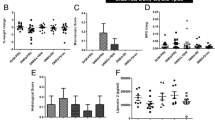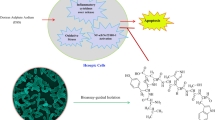Abstract
Background
We previously showed that supernatants of Lactobacillus biofilms induced an anti-inflammatory response by affecting the secretion of macrophage-derived cytokines, which was abrogated upon immunodepletion of the stress protein GroEL.
Methods
We purified GroEL from L. reuteri and analysed its anti-inflammatory properties in vitro in human macrophages isolated from buffy coats, ex vivo in explants from human biopsies and in vivo in a mouse model of DSS induced intestinal inflammation. As a control, we used GroEL purified (LPS-free) from E. coli.
Results
We found that L. reuteri GroEL (but not E. coli GroEL) inhibited pro-inflammatory M1-like macrophages markers, and favored M2-like markers. Consequently, L. reuteri GroEL inhibited pro-inflammatory cytokines (TNFα, IL-1β, IFNγ) while favouring an anti-inflammatory secretome. In colon tissues from human biopsies, L. reuteri GroEL was also able to decrease markers of inflammation and apoptosis (caspase 3) induced by LPS. In mice, we found that rectal administration of L. reuteri GroEL (but not E. coli GroEL) inhibited all signs of haemorrhagic colitis induced by DSS including intestinal mucosa degradation, rectal bleeding and weight loss. It also decreased intestinal production of inflammatory cytokines (such as IFNγ) while increasing anti-inflammatory IL-10 and IL-13. These effects were suppressed when animals were immunodepleted in macrophages. From a mechanistic point of view, the effect of L. reuteri GroEL seemed to involve TLR4, since it was lost in TRL4−/− mice, and the activation of a non-canonical TLR4 pathway.
Conclusions
L. reuteri GroEL, by affecting macrophage inflammatory features, deserves to be explored as an alternative to probiotics.







Similar content being viewed by others
References
Feagins LA, Souza RF, Spechler SJ. Carcinogenesis in IBD: potential targets for the prevention of colorectal cancer. Nat Rev Gastroenterol Hepatol. 2009;6:297–305.
Mowat AM, Agace WW. Regional specialization within the intestinal immune system. Nat Rev Immunol. 2014;14:667–85.
Hooper LV, Macpherson AJ. Immune adaptations that maintain homeostasis with the intestinal microbiota. Nat Rev Immunol. 2010;10:159–69.
Lozupone CA, Stombaugh JI, Gordon JI, et al. Diversity, stability and resilience of the human gut microbiota. Nature. 2012;489:220–30.
Schwabe RF, Jobin C. The microbiome and cancer. Nat Rev Cancer. 2013;13:800–12.
Kamada N, Seo SU, Chen GY, et al. Role of the gut microbiota in immunity and inflammatory disease. Nat Rev Immunol. 2013;13:321–35.
Tuohy KM, Probert HM, Smejkal CW, et al. Using probiotics and prebiotics to improve gut health. Drug Discov Today. 2003;8:692–700.
Ahl D, Liu H, Schreiber O, et al. Lactobacillus reuteri increases mucus thickness and ameliorates dextran sulphate sodium-induced colitis in mice. Acta Physiol (Oxf). 2016;217:300–10.
Lamas B, Richard ML, Leducq V, et al. CARD9 impacts colitis by altering gut microbiota metabolism of tryptophan into aryl hydrocarbon receptor ligands. Nat Med. 2016;22:598–605.
Oliva S, Di Nardo G, Ferrari F, et al. Randomised clinical trial: the effectiveness of Lactobacillus reuteri ATCC 55730 rectal enema in children with active distal ulcerative colitis. Aliment Pharmacol Ther. 2012;35:327–34.
Isidro RA, Appleyard CB. Colonic macrophage polarization in homeostasis, inflammation, and cancer. Am J Physiol Gastrointest Liver Physiol. 2016;311:G59-73.
Heinsbroek SE, Gordon S. The role of macrophages in inflammatory bowel diseases. Expert Rev Mol Med. 2009;11:e14.
Rieu A, Aoudia N, Jego G, et al. The biofilm mode of life boosts the anti-inflammatory properties of Lactobacillus. Cell Microbiol. 2014;16:1836–53.
Saibil H. Chaperone machines for protein folding, unfolding and disaggregation. Nat Rev Mol Cell Biol. 2013;14:630–42.
Henderson B, Fares MA, Lund PA. Chaperonin 60: a paradoxical, evolutionarily conserved protein family with multiple moonlighting functions. Biol Rev Camb Philos Soc. 2013;88:955–87.
Goloubinoff P, Gatenby AA, Lorimer GH. GroE heat-shock proteins promote assembly of foreign prokaryotic ribulose bisphosphate carboxylase oligomers in Escherichia coli. Nature. 1989;337:44–7.
Friedland JS, Shattock R, Remick DG, et al. Mycobacterial 65-kD heat shock protein induces release of proinflammatory cytokines from human monocytic cells. Clin Exp Immunol. 1993;91:58–62.
Shin H, Jeon J, Lee JH, et al. Pseudomonas aeruginosa GroEL stimulates production of PTX3 by activating the NF-kappaB pathway and simultaneously downregulating microRNA-9. Infect Immun. 2017;85(3):e00935.
Asea A. Chaperokine-induced signal transduction pathways. Exerc Immunol Rev. 2003;9:25–33.
Pais de Barros JP, Gautier T, Sali W, et al. Quantitative lipopolysaccharide analysis using HPLC/MS/MS and its combination with the limulus amebocyte lysate assay. J Lipid Res. 2015;56:1363–9.
Menck K, Behme D, Pantke M, et al. Isolation of human monocytes by double gradient centrifugation and their differentiation to macrophages in teflon-coated cell culture bags. J Vis Exp. 2014;(19):e51554.
Tsilingiri K, Barbosa T, Penna G, et al. Probiotic and postbiotic activity in health and disease: comparison on a novel polarised ex-vivo organ culture model. Gut. 2012;61:1007–15.
Tsilingiri K, Sonzogni A, Caprioli F, et al. A novel method for the culture and polarized stimulation of human intestinal mucosa explants. J Vis Exp. 2013;(75):e4368.
Gozzi GJ, Gonzalez D, Boudesco C, et al. Selecting the first chemical molecule inhibitor of HSP110 for colorectal cancer therapy. Cell Death Differ. 2020;27:117–29.
Hayer-Hartl M, Bracher A, Hartl FU. The GroEL-GroES chaperonin machine: a nano-cage for protein folding. Trends Biochem Sci. 2016;41:62–76.
Chassaing B, Aitken JD, Malleshappa M, et al. Dextran sulfate sodium (DSS)-induced colitis in mice. Curr Protoc Immunol. 2014;104:Unit 15 25.
Rath E, Berger E, Messlik A, et al. Induction of dsRNA-activated protein kinase links mitochondrial unfolded protein response to the pathogenesis of intestinal inflammation. Gut. 2012;61:1269–78.
Kim JJ, Shajib MS, Manocha MM, et al. Investigating intestinal inflammation in DSS-induced model of IBD. J Vis Exp. 2012;(60):3678.
Siegemund S, Sauer K. Balancing pro- and anti-inflammatory TLR4 signaling. Nat Immunol. 2012;13:1031–3.
Wirtz S, Neurath MF. Mouse models of inflammatory bowel disease. Adv Drug Deliv Rev. 2007;59:1073–83.
Zeissig S, Rosati E, Dowds CM, et al. Vedolizumab is associated with changes in innate rather than adaptive immunity in patients with inflammatory bowel disease. Gut. 2018;68(1):25–39.
Abreu MT. Toll-like receptor signalling in the intestinal epithelium: how bacterial recognition shapes intestinal function. Nat Rev Immunol. 2010;10:131–44.
Gren ST, Grip O. Role of monocytes and intestinal macrophages in Crohn’s disease and ulcerative colitis. Inflamm Bowel Dis. 2016;22:1992–8.
Arlet JB, Ribeil JA, Guillem F, et al. HSP70 sequestration by free alpha-globin promotes ineffective erythropoiesis in beta-thalassaemia. Nature. 2014;514:242–6.
Seignez A, Joly AL, Chaumonnot K, et al. Serum Gp96 is a chaperone of complement-C3 during graft-versus-host disease. JCI Insight. 2017;2:e90531.
Acknowledgments
This work was funded by the “Ligue National contre le Cancer”, the “Fondation pour la Recherche Médicale” FDT20170436927 and by a French Government grant managed by the French National Research Agency under the program “Investissements d’Avenir” with reference ANR-11-LABX-0021 (LabEX LipSTIC), ANR-15-IDE and ANR-15-IDE-0003 (I-SITE-BFC). We thank the ”Conseil Regional de Bourgogne-Franche Comté” and the European Union program FEDER for their financial support, and "Cellimap Dijon" and the “Plateforme de cytométrie Dijon” for technical support.
Author information
Authors and Affiliations
Corresponding author
Ethics declarations
Conflict of interest
The authors declare that they have no conflict of interest.
Additional information
Publisher's Note
Springer Nature remains neutral with regard to jurisdictional claims in published maps and institutional affiliations.
Supplementary Information
Below is the link to the electronic supplementary material.
Rights and permissions
About this article
Cite this article
Dias, A.M.M., Douhard, R., Hermetet, F. et al. Lactobacillus stress protein GroEL prevents colonic inflammation. J Gastroenterol 56, 442–455 (2021). https://doi.org/10.1007/s00535-021-01774-3
Received:
Accepted:
Published:
Issue Date:
DOI: https://doi.org/10.1007/s00535-021-01774-3




